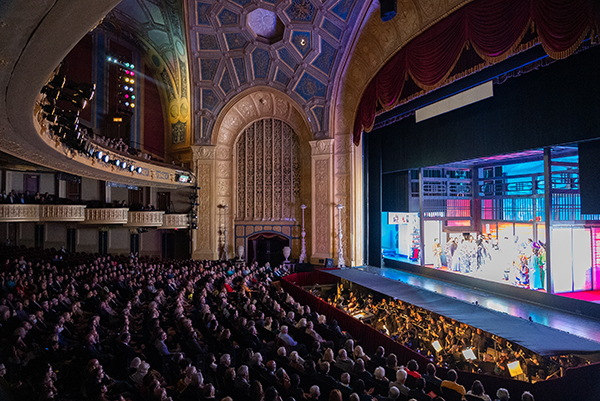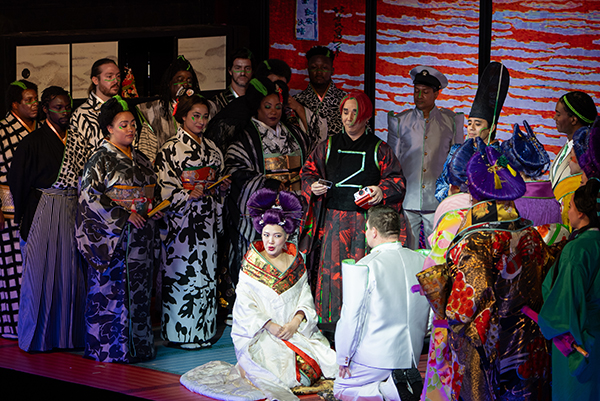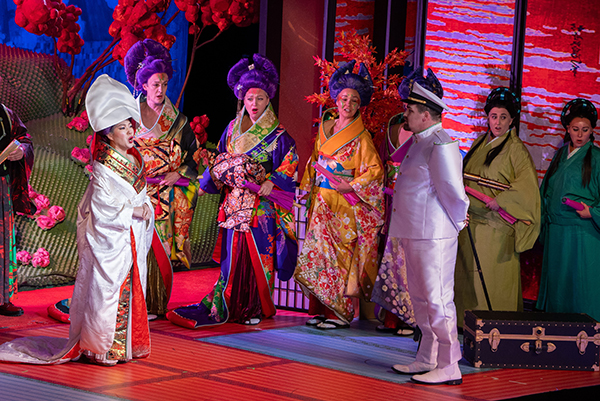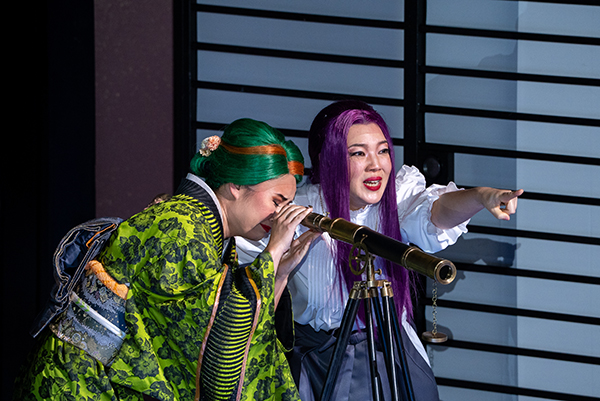by Kevin McLaughlin

Don’t get me wrong — there is much bigotry and male and racial chauvinism to call out in David Belasco’s play and Giuseppe Giacosa’s and Luigi Illica’s libretto, as well as a lack of agency of the lead. And Detroit’s Japanese and Japanese American artistic team of Matthew Ozawa (artistic director), Kimie Nishikawa (scenic design), Maiko Matsushima (costumes), and Yuki Nakase Link (lighting) did so, but without changing much.
Their version (a co-production with Cincinnati Opera, Pittsburgh Opera, and Utah Opera) leans into the white male fantasy aspect of the story, rather than mitigate or excuse it.
The time and place of the opening is updated to the present. B.F. Pinkerton (tenor Eric Taylor), though still the cad, is given a veneer of justification for — and plausible deniability of — his caddishness. Enter virtual reality gameplay. All of the opera’s action is played out as a virtual game seen through Pinkerton’s V-R glasses. Thanks to this conceit, along with a few staging tweaks, the characters and narrative receive less harsh judgement — and in Pinkerton’s case, a bit of a pass — even while the score and libretto are left largely intact.
a
The curtain rises in silence as we see a bored Pinkerton in his modern home turning to his usual source of entertainment: virtual reality gaming. He dons his V-R glasses and rejoins a fantasy game, transporting him to 19th-century Nagasaki where he, as the character of a U.S. Navy lieutenant, inspects a house that he will occupy with his new bride, Cio-Cio-San (a.k.a. Madame Butterfly).
The set pulls apart, creating a tripartite kind of shadow box. The modern apartment is split and pushed to the side. The fantasy panel is central and it’s where we see relatives gathering for the wedding of Pinkerton and Butterfly. The extraordinary lighting offsets the fantasy world from the modern with its electrified reds, pinks, and greens.
The costumes signal a kind of hyper-Japonaiserie, or perhaps gaming reality. Pinkerton’s fantasy-self rocked his admiral suit, with its tubular Flash Gordon arms and Stop Making Sense shoulders. Butterfly’s determination to Americanize herself is signaled by her relatively plain Western Edwardian garb, contrasted with her traditional Japanese wedding dress from earlier, and with Suzuki’s old-world costume.
Puccini’s heart-tugging score — Butterfly’s music in particular — convinces us of the genuineness of her credulity and the plausibility of the outcome. Soprano Karah Son, as the title character, sang with uncommon radiance and power. She poured her heart out in Act 2’s “Un bel di,” convincing us all of Pinkerton’s return. In body language and vocal assurance, she seemed to mature and strengthen before us, from the timid young girl of Act 1 to the full-grown woman committed to her sentry.
Taylor was a satisfying, and thanks to his V-R glasses, more sympathetic B.F. Pinkerton. His clear high notes and resonant vocalism, peaking with the splendid Act 3 cri du coeur, “Addio, fiorito asil,” also helped to redeem his character. In most productions this absentee-father remains out of sight for most of the opera before slinking back onstage to pour out his remorse. But in this version, he is a constant tormented presence on the edge of the stage, slouching and slumping with his goggles on. The audience was also sympathetic to the character: Taylor received no boos at the end (as is often the case) — only loud applause.
The mostly Asian and Asian American supporting cast was also first-rate. Mezzo-soprano Kristen Choi gave a particularly touching portrayal of the kind-hearted Suzuki, and her flower duet with Butterfly was thrilling. She also connected in scenes with the boy Trouble, endearingly played by Alexandra (“Allie”) Q. Yan, a local first grader.
Baritone Nmon Ford was compelling as Sharpless, holding the stage vocally and dramatically. Tenor Julius Ahn was persuasive as the marriage broker Goro, and bass Hyunjin Son was fearsome as Butterfly’s uncle, The Bonze. Baritone Rolfe Dauz made us all laugh at Prince Yamadori, the clumsy suitor.
Conductor Kensho Watanabe led the Detroit Opera Orchestra in a brightly paced, trouble-free performance. The orchestra, which recently hired a couple of new principal winds, was running on all cylinders.
In the end, the performances and music were what carried the evening. At some point the virtual-reality layer receded as Pinkerton’s headset came on and off, and the power of the music took hold.
After the final tragic deed, Butterfly breaks the fourth wall and steps out of the action. Pinkerton, no longer in control of the fantasy, holds onto the robe (the wings) of Butterfly’s former self, as Cio-Cio-San stands front and center, glaring at the audience. She has broken free of the game, broken free of Pinkerton, and broken free of the strictures placed upon her in life. She seems to accuse the onlooker: How dare you! I am no man’s fantasy!
Photos: Austin Richey, Detroit Opera.
Published on ClevelandClassical.com October 24, 2023.
Click here for a printable copy of this article






